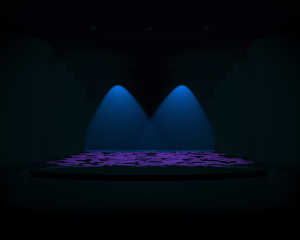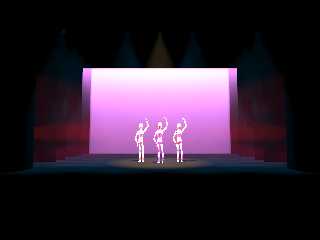 |
 |
|
 |
|
 |
|  |
|  |
|
 |
|
 |
|  |
|  |
|
 |
The model used here is an actual model of the theater I work in, done in
vectorworks by the technical director and converted through .stl to a
POV-Ray mesh.
Lighting is done with my work-in-progress theater macro system, and I
think it's showing some promise.
The one thing I can't figure out is the green color banding around the
outside. It may just be that the colors are so close together that 16bit
can't subdivide any more, but I hope that isn't the case. The colors are
just projected from a spotlight source (in the case of the color-banding
lights: radius=falloff/2) through a thin color-filtering cylinder (rgbf
<r,g,b,1>), which should give a clean transition?
Render took 00:02:09 in v3.7b31, then I retried it in MegaPOV 1.2.1,
which still showed the color banding and took 00:05:54. (I was expecting
3.7 to be a little less than twice as fast, but it seems like the core
improvements are even better than I thought)
cshake
Post a reply to this message
Attachments:
Download 'prosceniumtest.jpg' (151 KB)
Preview of image 'prosceniumtest.jpg'

|
 |
|  |
|  |
|
 |
|
 |
|  |
|  |
|
 |
CShake <cshake+pov### [at] gmail com> wrote:
> The one thing I can't figure out is the green color banding around the
> outside. It may just be that the colors are so close together that 16bit
> can't subdivide any more, but I hope that isn't the case.
The RGB values indicate that at 8-bits per channel, it is indeed at the limit.
Suggestions would be to lighten the image (the stage is very dark on my
monitor) to increase available levels in the unlit region, add crand to the
finish to simulate dithering, or just to export a 48-bit image and find a way
to dither it in an external program. As it is, even if png output is 48-bit,
it is clearly only a 24-bit jpg and has not been dithered along the way.
- Ricky com> wrote:
> The one thing I can't figure out is the green color banding around the
> outside. It may just be that the colors are so close together that 16bit
> can't subdivide any more, but I hope that isn't the case.
The RGB values indicate that at 8-bits per channel, it is indeed at the limit.
Suggestions would be to lighten the image (the stage is very dark on my
monitor) to increase available levels in the unlit region, add crand to the
finish to simulate dithering, or just to export a 48-bit image and find a way
to dither it in an external program. As it is, even if png output is 48-bit,
it is clearly only a 24-bit jpg and has not been dithered along the way.
- Ricky
Post a reply to this message
|
 |
|  |
|  |
|
 |
|
 |
|  |
|  |
|
 |
CShake <cshake+pov### [at] gmail com> wrote:
> Render took 00:02:09 in v3.7b31, then I retried it in MegaPOV 1.2.1,
> which still showed the color banding and took 00:05:54. (I was expecting
> 3.7 to be a little less than twice as fast, but it seems like the core
> improvements are even better than I thought)
Did you try the HDR output?
The banding looks like you've reached the dynamic limit of the image format in
dark regions. Try the following:
- Set output format to "H" in either 3.7 or MegaPOV
- Render the shot
- Load it into a sotftware like HDRView or HDRShop
So far, I'd expect the color banding to still show.
- Crank up the f-stops in HDRView / HDRShop
=> the color banding should disappear.
If it does, we're talking about image format issues. In that case, instroducing
some noise might help eliminate the banding (not sure at the moment how I'd do
that; maybe there is software that can convert HDR to PNG while introducing
some dithering in dark regions, but POV may have some weapons for this in its
arsenal, too). com> wrote:
> Render took 00:02:09 in v3.7b31, then I retried it in MegaPOV 1.2.1,
> which still showed the color banding and took 00:05:54. (I was expecting
> 3.7 to be a little less than twice as fast, but it seems like the core
> improvements are even better than I thought)
Did you try the HDR output?
The banding looks like you've reached the dynamic limit of the image format in
dark regions. Try the following:
- Set output format to "H" in either 3.7 or MegaPOV
- Render the shot
- Load it into a sotftware like HDRView or HDRShop
So far, I'd expect the color banding to still show.
- Crank up the f-stops in HDRView / HDRShop
=> the color banding should disappear.
If it does, we're talking about image format issues. In that case, instroducing
some noise might help eliminate the banding (not sure at the moment how I'd do
that; maybe there is software that can convert HDR to PNG while introducing
some dithering in dark regions, but POV may have some weapons for this in its
arsenal, too).
Post a reply to this message
|
 |
|  |
|  |
|
 |
|
 |
|  |
|  |
|
 |
I've made some improvements to my macros, and here's another test image.
It's a basic dance concert light rig, still very simple. I know much of
the image is dark, I still need to play with the radiosity brightness.
2.5 hours in MegaPOV 1.2.1, would have used 3.7 but the fog caused it to
crash with an out of memory error (which I posted about in p.beta-test)
I decided to create the figure model myself in Wings3d since I couldn't
find one easily. It's not well featured, and has no good way to position
it without changing the model itself.
Post a reply to this message
Attachments:
Download 'demotheatersysfog.png' (141 KB)
Preview of image 'demotheatersysfog.png'

|
 |
|  |
|  |
|
 |
|
 |
|  |
|
 |




![]()